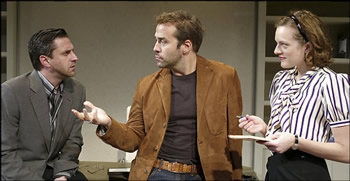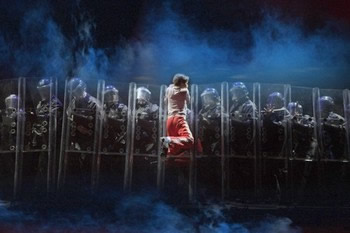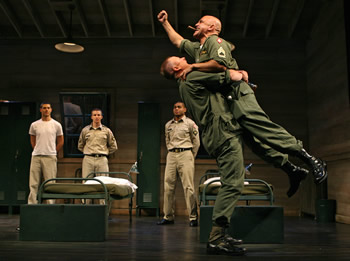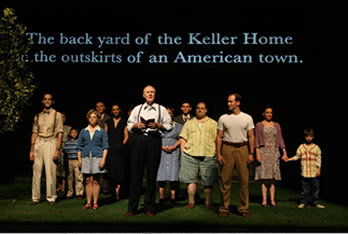HotReview.org Editor's
Picks
Shows Worth Seeing:

Speed-the-Plow
By David Mamet
Ethel Barrymore Theatre
243 W. 47th St.
Box office: (212) 239-6200
Once in a while, an actor—invariably
male—locates the music within David Mamet’s bullying
staccato language with such deep and intense sympathy that he
ends up suffusing the play with magnificent light, even though
everything he says is disgusting. This happened several times
with Joe Mantegna in the 1980s (in Glengarry Glen Ross
and Speed-the-Plow), and it’s happening now in
Neil Pepe’s superb revival of Speed-the-Plow. I
refer not to the HBO headliner Jeremy Piven who is fine as Hollywood
producer Bobby Gould (the role originated by Mantegna) but rather
to the amazing stage actor opposite him, Raul Esparza. Esparza
pumps up the role of Charlie Fox, Gould’s less powerful
associate, with such absurdly supercharged aggression that his
cynical quips drop like philosophical pearls, and his manic movements
become the stuff of a sort of amazing and hilarious dance. He
leaves you breathless, not only because of his energy but because
there isn’t a false note in the whole manic race he runs
for 85minutes. Pepe was also shrewd to cast Elisabeth Moss (from
Mad Men) as Karen, the office temp who almost ruins the
boys’ blockbuster movie deal by injecting a dose of sincerity
along with the sex requested of her. Because Moss is a bit older
and less bimboesque than the typical Karen, the audience can take
her somewhat more seriously than they otherwise would, and that
makes her threat more substantial. Speed-the-Plow is
not a think piece. It’s more like the dramatic equivalent
of one of those G-force simulators they use to train astronauts,
and if you enjoy that sort of exhilarating flattening, this is
the show for you.
-------------------------------

Billy Elliot: the Musical
Directed by Stephen Daldry, Book and lyrics by Lee Hall, Music
by Elton John
Imperial Theatre
249 W. 45th St.
Box office: (212) 239-6200
Curiously enough, this eagerly
awaited musical adaptation of the movie Billy Elliot
is almost as good as its hype. The story about a boy from a gritty
northern English coal-mining town who discovers a passion for
ballet was always irresistibly charming—just the sort of
triumph-against-the-odds, home-town-boy fairytale Hollywood got
rich on. The British adaptors of this show have been unusually
clever, though, in giving the tale strong theatrical legs. Elton
John’s rousing anthems and ballads pull all the right heartstrings
to make the audience cheer for both the boy’s success and
the victory of the union in the 1980s miners’ strike that
forms the play’s social background. But since that strike
ultimately failed—the Thatcher government famously broke
the union—the play’s impassioned cries of “solidarity”
have decidedly funereal overtones, and the story of the boy’s
individual triumph has particular poignancy against the bitter
failure of his loved ones’ collective action. This incongruity
gives the work a modest political complexity that other Cinderella
stories lack. The show is also wonderfully inventive. Director
Stephen Daldry (who also directed the movie) has inserted bizarrely
fluid choruses of cops and miners, for instance, who spread their
good and bad energy willy-nilly while sweeping through windows,
gyms and kitchens. At one point, Billy dances a strangely anomalous
pas de deux with his imagined older self, who seems to
provide the only viable adult role model he can muster. There
are half a dozen inspired creations of this kind, as well as superb
performances by (among others): Haydn Gwynne, who finds just the
right mixture of stoniness and congealed syrup for Billy’s
dance teacher; Carole Shelley as his wacked out grandmother; and
the three child-actors who play Billy (I saw Kiril Kulish). It
feels decidedly odd to endorse a blockbuster London import in
this way, but, well, this show deserves to be seen.
----------------------------

Streamers
By David Rabe
Laura Pels Theatre
111 W. 46th St.
Box office: (212) 719-1300
What a happy surprise this
Roundabout revival of Streamers is. I vaguely remember
liking David Rabe’s play when it first appeared more than
three decades ago, but I haven’t seen or read it since and
who trusts memories that old? Turns out, it does tell a crackling
good story, as I remembered. More than that, though, I now see
that it’s one of those rare American plays that transcends
its strict realism due to the author’s sheer power of concentration,
his ability to follow through unflinchingly while tracing out
the consequences of his shrewdly drawn, volatile given circumstances.
Rabe never blinks in depicting this awful collision between soldiers
of different classes, races and sexual orientations, who are thrown
together in a Virginia army barracks while awaiting probable orders
to Vietnam. The outlines of the play’s scenario, thus described,
may easily sound like a yawn, since countless plays and movies
have exploited it for tendentious or sentimental ends. No easy
bromides or message-billboards for Rabe, though. His people are
dauntingly complex and multi-colored, and their terrible showdown
has broad allegorical resonance, even an air of tragic inevitability.
Scott Ellis’s production is smart, swift and unexpectedly
potent given that he keeps it rather cool until the climactic
violence. The actors are clear and penetrating, though some are
definitely stronger than others: J.D. Williams is dead-on as diplomatic
Roger, as is Ato Essandoh as menacing Carlyle, but Brad Fleischer
never quite finds the blustery uncertainty that sets Billy up
as a sacrificial goat. In any case, the strength of the ensemble
makes up for spotty deficiencies, and the people seated around
me were visibly shaken by the ending.
--------------------------------

All My Sons
By Arthur Miller
Gerald Schoenfeld Theatre
236 W. 45th St.
Box office: 212-439-6200
For obscure reasons, we seem
to need the British to show us how to breathe life into America’s
most heroic dramatist from the last century. This time it’s
the director Simon McBurney who has taken an Arthur Miller play
more than 60 years old and made it seem as fresh as a new Tony
Kushner work. I’ve seen All My Sons several times
before, and it has always seemed to me a rather straightforward
nugget of 1930s leftist moralism: the protagonist, Joe Keller,
is a heel because he knowingly sold defective airplane parts to
the Army Air Force during wartime and blamed his partner for the
crime, all (he says) so he could leave his sons a successful business—an
extremely moving but also rather tidy and obvious fable demonstrating
the necessity to look beyond callous capitalist imperatives to
our larger social responsibilities. Refreshingly, McBurney’s
production reveals a more complex tale where motives are deeper
and more contradictory than the characters’ self-justifying
bluster implies. Patrick Wilson’s Chris, for instance, the
dutiful war-veteran son whose uncompromising idealism drives Joe
to suicide in the end, comes across here not as a hapless naïf
but rather as another type of killer, ruthless in moral rigidity
where Joe was ruthless in profit-seeking. Diane Wiest as Joe’s
wife Kate and Katie Holmes as Ann, the girl Chris wants to marry,
are just as multifarious in their nuances. The production is also
a visual feast, with sumptuous animated projections against a
clapboard back wall and a Midwestern yard sketched with just the
right iconic objects (design by Tom Pye). In an interview in the
1990s, Miller said that All My Sons was being produced
more than many of his other plays, and he guessed it was because
of the high number of public investigations going on into official
malfeasance in business and government. Had he lived a little
longer, he would have understood another reason: the arrival of
apparently endless war, which has made the genre of returning-soldier
drama heart-breakingly apt. All My Sons is more than
a returning-soldier drama, but that aspect of it is hard to forget
as the climax arrives and drives home the pointed question of
how basic our civilized values are, and what it really means for
a nation to say, reflexively and habitually, that we must win
at all costs.
